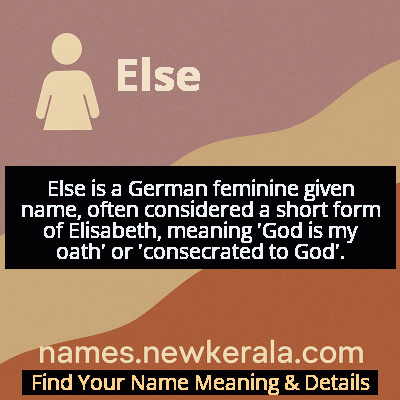Else Name Meaning & Details
Origin, Popularity, Numerology Analysis & Name Meaning of Else
Discover the origin, meaning, and cultural significance of the name ELSE. Delve into its historical roots and explore the lasting impact it has had on communities and traditions.
Name
Else
Gender
Female
Origin
German
Lucky Number
5
Meaning of the Name - Else
Else is a German feminine given name, often considered a short form of Elisabeth, meaning 'God is my oath' or 'consecrated to God'.
Else - Complete Numerology Analysis
Your Numerology Number
Based on Pythagorean Numerology System
Ruling Planet
Mercury
Positive Nature
Adventurous, dynamic, curious, and social.
Negative Traits
Restless, impatient, inconsistent, prone to indulgence.
Lucky Colours
Green, white.
Lucky Days
Wednesday.
Lucky Stones
Emerald.
Harmony Numbers
1, 3, 9.
Best Suited Professions
Sales, marketing, travel, entertainment.
What People Like About You
Versatility, charisma, adventurous spirit.
Famous People Named Else
Else Lasker-Schüler
Poet and Playwright
Leading German expressionist poet, awarded the Kleist Prize in 1932
Else Ury
Children's Author
Created the popular 'Nesthäkchen' book series, one of Germany's most successful children's authors
Else Ackermann
Pharmacologist and Politician
Prominent East German scientist and CDU politician, known for her work in pharmacology
Else Jarlbak
Physician
First female chief physician in Denmark, pioneer in women's healthcare
Name Variations & International Equivalents
Click on blue names to explore their detailed meanings. Gray names with will be available soon.
Cultural & Historical Significance
Extended Personality Analysis
Individuals bearing the name Else are often characterized by a remarkable blend of intellectual depth and emotional intelligence. Their 'noble' etymology manifests in a natural dignity and grace that others find both impressive and approachable. Elses typically possess strong observational skills, preferring to analyze situations thoroughly before acting or speaking. This thoughtful approach makes them excellent strategists and problem-solvers in both personal and professional contexts. Their loyalty, stemming from the 'oath' meaning in their name's origin, makes them incredibly reliable friends and partners who honor their commitments with unwavering dedication. Many Elses demonstrate artistic or creative talents, often expressing themselves through writing, visual arts, or music. They value authenticity and tend to be uncomfortable with superficiality or pretense. While they may appear reserved initially, those who earn their trust discover warm, compassionate individuals with sharp wit and deep empathy. Their strength often lies in quiet perseverance rather than overt displays of power, making them particularly effective in roles requiring patience and long-term vision.
Modern Usage & Popularity
In contemporary naming practices, Else has experienced a notable renaissance as part of the broader trend toward vintage names with substance and history. While it remains relatively uncommon compared to its variations like Elsa or Elsie, this rarity has become part of its appeal for parents seeking distinctive yet classic names. In Germany, the name has seen a steady increase in popularity, particularly among educated urban families who appreciate its literary and historical associations. Scandinavian countries continue to embrace Else as a traditional choice that feels both timeless and fresh. Internationally, the name benefits from the popularity of Scandinavian design and culture, with its clean, simple elegance appealing to modern sensibilities. Social media and global connectivity have also contributed to its renewed visibility, allowing parents to discover names beyond their immediate cultural context. The name's versatility across languages and its ability to sound both sophisticated and approachable make it an attractive choice for internationally-minded families. Current naming data shows that Else is particularly popular among parents in their 30s and 40s who value names with cultural depth and character.
Symbolic & Spiritual Meanings
Symbolically, Else represents the convergence of tradition and individuality, embodying the idea that one can honor heritage while maintaining personal authenticity. The name's primary meaning of 'noble' extends beyond aristocratic connotations to symbolize moral integrity and inner dignity. It suggests someone who carries themselves with grace regardless of circumstances, representing the concept that true nobility comes from character rather than birthright. The secondary meaning 'God is my oath' adds layers of spiritual commitment and reliability, making Else symbolic of faithfulness and trustworthiness. In metaphorical terms, the name represents the quiet strength found in observation and reflection - the power of understanding that comes from listening rather than dominating conversations. Else also symbolizes the bridge between generations, carrying forward traditional values while adapting to contemporary contexts. The name's simplicity belies its depth, much like the individuals who bear it - appearing unassuming at first glance but revealing remarkable complexity upon closer acquaintance. In many ways, Else represents the beauty of understatement and the power of authenticity in a world often dominated by superficiality.

